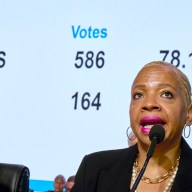For those weary of the cuddly Robert De Niro, the gentle uplift of his latest film, “Everybody’s Fine,” probably isn’t going to be tonic for the soul. But midway through the movie, there is a flash of the old, unpredictable and delightfully unmanageable De Niro when his character, feeling unappreciated by his grown children, goes off on a subway panhandler for a perceived breach of etiquette.
De Niro offers a master class of mannered, minimalist acting in “Everybody’s Fine.” And if writer-director Kirk Jones (“Waking Ned Devine”) had allowed his lead actor a bit more room to roam into the dark corners of his character, the movie’s fast path toward late-life insight would have felt more earned. Still, De Niro’s work possesses such a quiet power that Jones’ well-crafted film disappoints only in the sense that it could delivered more.
We first see De Niro’s character, retiree Frank Goode, preparing for the homecoming of his four adult children. With the cardigan-dad strains of Perry Como playing in the background, Frank meticulously puts his home and garden in order. When the music stops playing, the phone starts ringing. Each “kid” begs off the reunion, using last-minute excuses that sound like just that excuses.
So Frank, recently widowed and on heart medication, decides to ignore his doctor’s advice and head out on a cross-country road trip to visit his offspring. He travels first to New York where there’s no sign of his troubled artist son, David (Austin Lysy). He surprises career-minded Amy (Kate Beckinsale) in Chicago, slacker musician Robert (Sam Rockwell) in Colorado and free-spirit Rosie (Drew Barrymore) in Vegas.
Frank’s presence at each stop isn’t exactly welcomed, and we gradually come to understand why. Frank spent his entire adult life working double shifts so his children could succeed. And, for Frank, failure was not an option. If they didn’t achieve, the kids would hear about it from him. To some degree, that dynamic remains in effect.
Jones should have made Frank a little less huggable, though both the character and the movie itself aren’t nearly as manipulative as Giuseppe Tornatore’s 1990 original, which Jones adapted. If Frank’s interactions with his grown children had more of an edge, though, the contrast between the reality of the relationships and his perception of them would have been truly heartbreaking.
Instead, Jones achieves a certain wistfulness. Rockwell, Barrymore and Beckinsale all shine in their brief screen time, with De Niro’s scenes with Rockwell packing the kind of tension the movie could have used to better advantage.
“Mom used to say, ‘Make your dad proud. He works hard for us,”‘ Rockwell’s Robert tells Frank. “Well, I know you’re not proud.”
Frank dismisses the candour, unequipped to deal with it since his wife always handled the family’s emotional issues. The strength of “Everybody’s Fine” is watching De Niro slowly transform Frank into a father willing to listen and accept his children for who they are and not who he wanted them to be. De Niro gives the familiar-feeling movie the chance to be a Father’s Day perennial.
“Everybody’s Fine,” a Miramax Films release, is rated PG-13 for thematic elements and brief strong language. Running time: 100 minutes. Three stars out of four.
–
Motion Picture Association of America rating definitions:
G – General audiences. All ages admitted.
PG – Parental guidance suggested. Some material may not be suitable for children.
PG-13 – Special parental guidance strongly suggested for children under 13. Some material may be inappropriate for young children.
R – Restricted. Under 17 requires accompanying parent or adult guardian.
NC-17 – No one under 17 admitted.
















